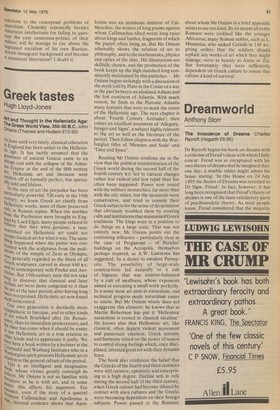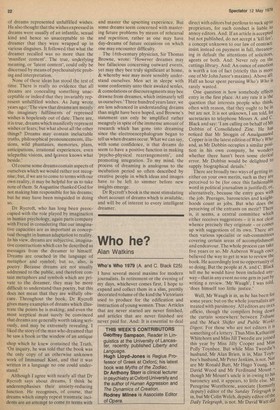Dreamworld
Anthony Storr
The Innocence of Dreams Charles Rycroft (Hogarth £6.95) Dr Rycroft begins his book on dreams with a criticism of Freud's ideas with which I fully concur. Freud was so enraptured with his own theory of dreams that he imagined that, one day, a marble tablet might adorn his house stating; 'In this House on 24 July 1895 the Secret of Dreams was revealed to Dr Sigm. Freud.' In fact, however, it has long been recognised that Freud's theory of dreams is one of the least satisfactory parts of psychoanalytic theory. As most people know, Freud considered that the majority of dreams represented unfulfilled wishes. He also thought that the wishes expressed in dreams were usually of an infantile, sexual kind and hence so unacceptable to the dreamer that they were wrapped up in various disguises. It followed that what the dreamer recalled was no more than the 'manifest content'. The true, underlying' meaning, or 'latent content', could only be discerned by means of psychoanalytic probing and interpretation.
None of these ideas has stood the test of time. There is really no evidence that all dreams are concealing something unacceptable or indeed that they invariably represent unfulfilled wishes. As Jung wrote years ago: 'The view that dreams are merely the imaginary fulfilments of repressed wishes is hopelessly out of date. There are, it is true, dreams which manifestly represent wishes or fears; but what about all the other things? Dreams may contain ineluctable truths, philosophical pronouncements, illusions, wild phantasies, memories, plans, anticipations, irrational experiences, even telepathic visions, and !leaven knows what beside.'
Of course some dreams contain aspects of ourselves which we would rather not recognise; but, if we are to come to terms with our own reality, it may be helpful for us to take note of them. St Augustine thanked God for not making him responsible for his dreams; but he may have been misguided in doing so.
Dr Rycroft, who has long been preoccupied with the role played by imagination in human psychology, again parts company with Freud in considering that our imaginative capacities are as important as conceptual thought in human adaptation to reality. In his view, dreams are subjective, imaginative constructions which can be described as messages from the dreamer to himself. Dreams are couched in the language of metaphor and symbol; but so, also, is poetry. Because dreams are not usually addressed to the public, and therefore contain metaphors and symbols which are private to the dreamer, they may be more difficult to understand than poetry, but this does not mean that they are wilfully obscure. Throughout the book, Dr Rycroft gives many examples of dreams which illustrate the points he is making; and even the most sceptical must surely be convinced that dreams are generally worth taking seriously, and may be extremely revealing. I liked the story of the man who dreamed that he saw a book in'the window of an antique shop which he knew contained the Truth. 'On inquiry, he was told that the book was the only copy of an otherwise unknown work of Immanuel Kant, and that it was written in a language no one could understand.'
Although I agree with nearly all that Dr Rycroft says about dreams, I think he underemphasises their anxiety-reducing function. He recognises, of course, that dreams which simply repeat traumatic incidents are an attempt to come to terms with and master the upsetting experience. But some dreams seem concerned with mastering future problems by means of rehearsal and repetition, rather as one may have day-dreams of future occasions on which one may encounter difficulty.
The 16th-century physician, Sir Thomas Browne, wrote: 'However dreames may bee fallacious ccincerning outward events, yet may they bee truly significant at home, & whereby wee may more sensibly understand ourselves. Men act in sleepe with some conformity unto their awaked senks, & consolations or discoureagments may bee drawne from dreames, which intimately tell us ourselves.' Three hundred years later, we are less advanced in understanding dreams than might have been hoped, and Browne's statement can only be amplified rather meagrely in spite of the immense amount of research which has gone into dreaming since the electroencephalogram began to tell us when dreams occur. What we can say, with some confidence, is that dreams do seem to have a positive function in making 'psycho-physical rearrangements', and promoting integration. To my mind, the process of dreaming is analogous to the incubation period so often described by creative people in which ideas and images have to be left to simmer before new insights emerge.
Dr Rycroft's book is the most stimulating short account of dreams which is available, and will be of interest to every intelligent dreamer.
THIS WEEK'S CONTRIBUTORS Geoffrey Sampson, Reader in Lin guistics at the University of Lancaster, recently published Liberty and Language.
Hugh Lloyd-Jones is Regius Pro fessor of Greek at Oxford; his latest book was Myths of the Zodiac.
Dr Anthony Storr is clinical lecturer in psychiatry at Oxford University and the author of Human Aggression and The Dynamics of Creation.
Rodney Wines is Associate Editor of 0 era.



































 Previous page
Previous page